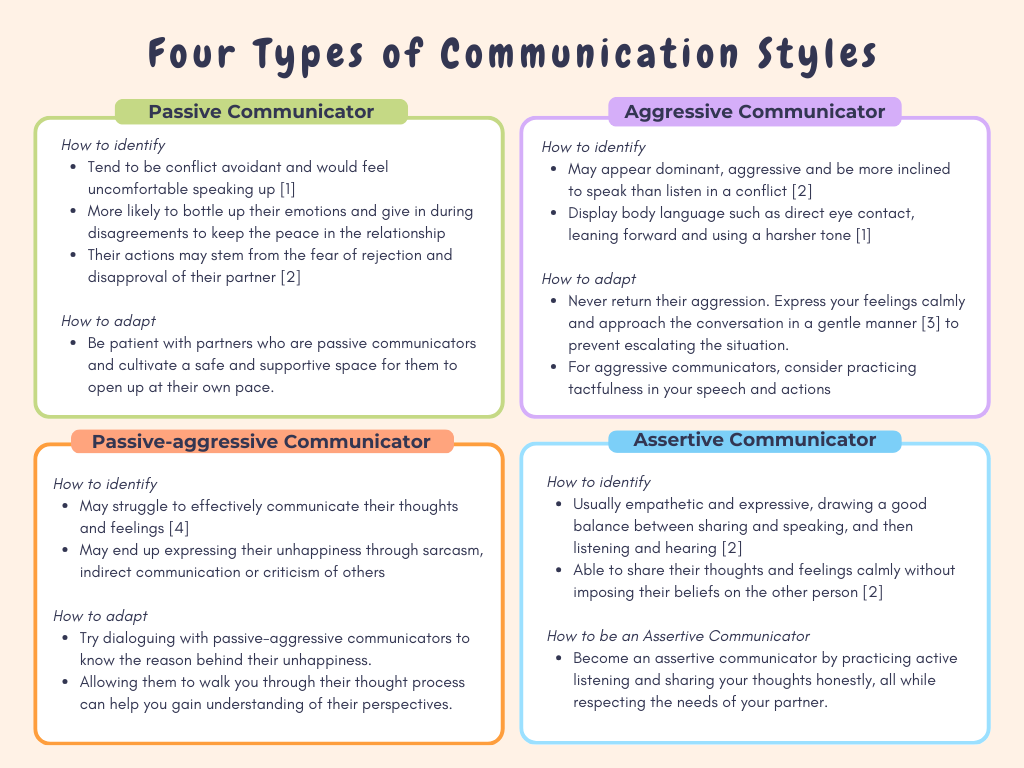Establishing good communication is the key to maintaining strong and long-lasting relationships. While some may not have issues communicating their feelings, others may struggle to do the same. Sometimes, we shy away from communication for the fear of managing conflicts, being vulnerable or we simply lack the ability to express our needs properly. You may end up sweeping things under the carpet, which can lead to miscommunications and hurting each other unintentionally. The good news is that communication is a skill that can be learnt. Your communication with your partner can be one that's healthy and more effective when you have the right tools and understanding.
Did you know that there are different types of communication styles? Understanding and identifying which type you and your partner gravitate towards will help to strengthen communication between the both of you.
Here are the four common communication styles:

In addition to identifying the communication style which you and your partner tend to gravitate towards, adopting the following strategies may help you and your partner to strengthen and improve your communication skills.
Set aside time to talk: Make time for intentional conversations. A good practice is setting aside a time every week to share one thing that you’re thankful about your partner, one thing that you want to apologise for and one thing that your partner said or did that may have bothered you. This may be helpful for couples who are not used to expressing themselves normally. The more you spend time reflecting and sharing your feelings, the easier it gets for you to open up and be vulnerable.
Communicate your needs clearly: Do not expect your partner to read your mind. Instead, have an open discussion about what concerns you by stating the how and why behind your feelings [5]. Everyone has different needs, so avoid belittling or disrespecting the needs of your partner. Listen attentively and then find a compromise that meets both of your needs [5].
Respond and not react: Have you ever reacted out of anger and frustration only to regret later? The truth is we often react to others without thinking through and end up hurting the person we’re communicating with [6]. When we take time to calm down and consider how we can better respond in a kind and loving manner, the response is usually more composed and less threatening. The next time you find yourself growing upset or angry at your partner, step away from the conversation and approach it only when you’re ready to talk about it.
Establish a pattern of openness: Encourage openness in the relationship by creating a safe space for sharing. Start by being transparent about your feelings and encouraging them to do the same. Refrain from responding in an angry or hurtful way when your partner talks about their unhappiness. That may discourage them from sharing, especially when your response is often not forthcoming. Make sure that you and your partner both feel heard, respected and understood [7].
Appreciate and affirm your partner: Communication is also about appreciating and affirming your partner. Say thank you when your partner caves out time for you or runs an errand for you. Small gestures of appreciation go a long way in making your partner feel loved and valued.
Keep in mind that good communication is understanding yourself and your partner while finding a balance between sharing and listening. Seek to listen to understand and take time to respond with grace and kindness when navigating conflicts. Remember that you are a team and working together to establish healthy communication is what helps you to flourish as a team.
Are you married or working towards marriage and interested to build a fulfilling and long-lasting relationship with your partner? Contact TOUCH Marriage Support at [email protected] or click here to find out more.
TOUCH Marriage Support aims to enrich marriages to build a strong foundation for families. Through a range of holistic programmes led by experienced marriage educators and counsellors, TOUCH Marriage Support prepares young couples for marriage, strengthens spousal relationships, guides couples through conflict resolution, and empowers couples to navigate and cope with the stressors and challenges which they may face in their marriage.
Sources
1. “The five common relationship styles and how they affect relationships” Life Insight, 5 Feb. 2021, https://life-insight.com/the-5-communication-styles-and-how-they-affect-relationships/
2. Nicole, Pager. “Navigating different communication styles in relationships” Shondaland, 12 May. 2021, https://www.shondaland.com/live/family/a36396758/navigating-different-communication-styles-in-relationships/
3. Elizabeth, Scott. “Aggressive communication: examples and how to handle it” Shondaland, 4 Dec. 2023, https://www.verywellmind.com/what-is-aggressiveness-aggressiveness-in-communication-3145097
4. Bethany, Juby. “How to respond to passive-aggressive person” Psych Central, 27 Oct. 2022, https://psychcentral.com/relationships/how-to-deal-with-a-passive-aggressive-person#how-to-respond
5. “Tips on how to effectively communicate your needs in a relationship” Psychology Beverly Hills, https://www.psychologybeverlyhills.com/blog/tips-on-how-to-effectively-communicate-your-needs-in-a-relationship
6. Apollonial, Ponti. “Reacting vs responding. How to communicate and handle anything” Psych Central, 27 Oct. 2022, https://www.apolloniaponti.com/reacting-vs-responding-how-to-communicate-and-handle-anything/
7. “How to create a culture of open communication” LinkedIn, 25 Sep. 2023, https://www.linkedin.com/advice/3/how-can-you-create-culture-open-communication-1c